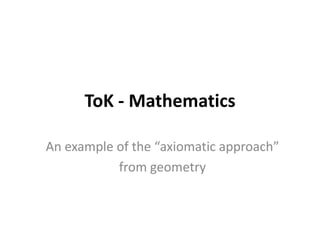
Theory of Knowledge - mathematics philosophies
- 1. ToK - Mathematics An example of the “axiomatic approach” from geometry
- 2. Axioms • These are assumptions and definitions which can be used to prove new results • Axiomatic assumptions do not have to be proved themselves, because they seem evident, for example - Angles on a straight line total two right angles - All right angles are equal to each other - Any two points may be joined by a straight line • And so on...
- 3. Using axioms to get new results (theorems) a • • • • • • b c Prove that if a + c = two right angles, then b = c 1 a + c = two right angles (given in the problem) 2 a + b = two right angles (on a straight line) 3 therefore a + c = a + b (law of logic) 4 therefore c = b (law of logic) 5 therefore b = c (law of logic)
- 4. A little philosophy... • Some propositions (statements which may or may not be true) actually have to be true by definition. The “classic” example is “All bachelors are unmarried”. • These are known as analytic propositions • Non-analytic propositions are called synthetic
- 5. How do we decide if a proposition is true? • If we can tell that a proposition is true independent of experience, the proposition is called true a priori • If we can only tell that a proposition is true by means of experience, the proposition is called true a posteriori
- 6. Some possible analyses for mathematics A posteriori A priori Analytic We say that 2 + 2 = 4 ( or II + II = IV, or whatever symbols you wish to use) in any situation just because we have chosen to define arithmetic in this way. FORMALISM IMPOSSIBLE Synthetic We say that 2 + 2 = 4 in any situation because it is an example of something that we can tell independent of direct experience but that does not just follow from the definition. PLATONISM We say that 2 + 2 = 4 in any situation because we have experienced instances of this truth and have generalised from there. EMPIRICISM
- 7. Some main objections to these views • Empiricism: when you compare maths to science, for example, the degree of certainty seems much greater. Compare a scientific generalisation such as “all metals expand on heating” to “2n + 2n = 4n, whatever n stands for”. • Formalism: if mathematical statements are true or false just by definition, how come there are statements like Goldbach’s conjecture which we do not yet know the truth or falsehood of? How come our definitions have produced results which describe the real world so well?
- 8. and Platonism? • This entails a world view where some truths can be found by reason alone • This view suffered a setback in the 18th & 19th centuries with the discovery of new geometries apart from the usual Euclidean (flat) type, but which obeyed the same basic axioms. The new geometries didn’t seem to describe the world as well as the original Euclidean type, but still worked very well within themselves (were consistent)
- 10. A bigger problem for formalism • In 1931, the German logician Kurt Godel proved two Incompleteness Theorems. • These very technical proofs considered finding all the (true) results that could be deduced from a given set of axioms • Godel proved that there would always be some true result which would be omitted from the list (ie the list would be incomplete)
- 11. • Godel showed that the result “This statement cannot be deduced from the axioms you started with.” had to be true • Therefore, however you tried to list all the results for your axioms, you would never get all the true statements • In other words, Maths had to be more than just applying logical (or illogical!) rules to a set of axioms and representing the results symbolically
- 12. Discovered or created? • • • • What would a formalist say? What would a Platonist say? What would an empiricist say? What do you think?
- 13. Is “discovery vs creation” a false dilemma? • Mathematicians create theories (eg differential calculus, spherical geometry, group theory) • Once the theory is created, the results within the theory are discovered (eg d/dx (x2) = 2x) • Therefore Mathematics involves both discovery and creation